IPF Webinar on “Psychology in Indian Knowledge Traditions”
Total Views |
IPF Webinar on
“Psychology in Indian Knowledge Traditions”
December 4, 2021
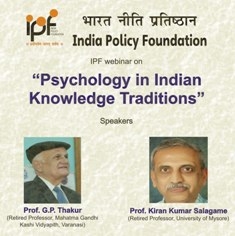
Speakers:
Prof. G. P. Thakur (Retired Professor, Mahatma Gandhi Kashi Vidyapith, Varanasi)
Prof. Kiran Kumar Salagame (Retired Professor, University of Mysore)
Moderator:
Dr Kuldeep Ratnoo (Director, India Policy Foundation)
Dr Kuldeep Ratnoo:
I welcome you all to today’s webinar organised by India Policy Foundation. Today’s topic is ‘Psychology in Indian Knowledge Traditions.’ This topic is very interesting. All of us keep hearing about and keep reading about humans having more and more psychological problems. There is an increased awareness and increased search for psychological solutions for living a peaceful life. Individuals, not only in the western societies but increasingly in India also are getting restless, losing hope and many of them are losing hope entirely and committing suicide. There is immense amount of literature available on web. There are so many motivators, so-called mental health experts who keep giving gyan (knowledge) on different issues but there is a catch. The problem is that most of psychology which we read and which we teach is based on Euro-American ideas. All the psychological concepts, all the psychological models, almost all the psychological solutions have been provided by the Euro-American psychologists. There is very little from the eastern side of the world.
Indian psychology has definitely come to be recognised. There have been various attempts by Indian psychologists to propose their ideas and their knowledge. But again, the emphasison recognising the need for exploring Indian knowledge traditions, Indian knowledge systems and Indian knowledge practices. These are the vast reservoirs of knowledge. Indians, since centuries ago, in fact I would say, thousands of years ago, have been collecting knowledge based on human experience. And this knowledge is not only what we call the paroksh gyan (indirect knowledge) but it is also based on what we call the pratyaksh gyan or direct cognition. This vast reservoir of knowledge, collected through sadhna, not only through adhyayan or swadhyay but also through anubhutis and then proved through pramans or results, needs to be explored. Definitely, there have been attempts by such psychologists and we are lucky to have two such experts with us today. They have done a lot of studies and written a lot on these issues. We are really fortunate to have them with us today. We will be hearing from them why it is important and what are the sources and concepts available in Indian knowledge traditions and why they are becoming increasingly important in the world, in what we know as psychology.
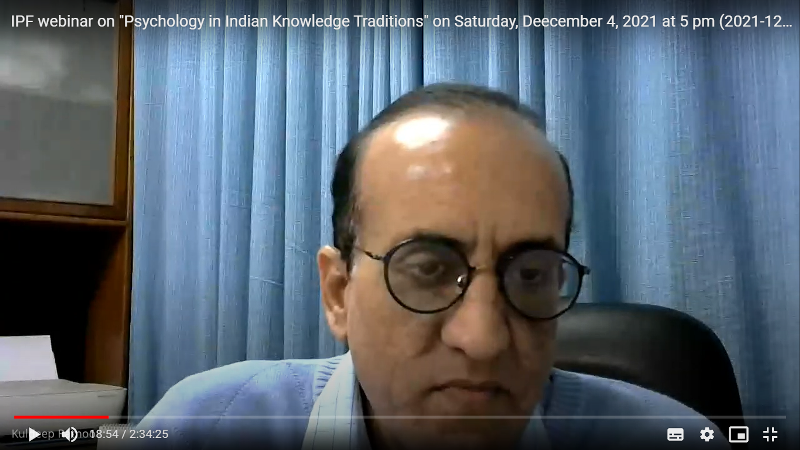
Now I request my colleague Ms. Lekshmi Parameswaran to kindly give brief introduction of the two speakers.
Lekshmi Parameswaran:
Namaskar!
Prof G. P. Thakur is an eminent psychologist, admired greatly by the fellow psychologists, including younger generation, for his academic contributions, pleasant personality and positive attitude.
Presently he is Honorary Distinguished Visiting Professor in Avinashilingam University of Women at Coimbatore; and as Honorary Director, Centre for Advanced Research on Development and Change, New Delhi.
Professor Thakur retired as Professor from Mahatma Gandhi Kashi Vidyapith, Varanasi where he handled various academic and administrative responsibilities, like
• Head, Department of Psychology;
• Dean, Faculty of Social Sciences;
• Dean, Faculty of Science & Technology;
• Director, Career Planning & Counselling Centre;
• Registrar and Finance Officer;
• Chief Proctor & Special Executive Magistrate:
• Chairman, University Sports Council and many more responsibilities
In more than five decades of his active role as a Psychologist, Prof Thakur has published a large number of research papers in Journals of national and international repute; Research monographs, chapters in books on personality, perception, psychology of aging, death anxiety, mental health, depression and sport psychology areas in addition to development of several psychometric tests for diagnostic use in clinical settings.
He has travelled extensively to different parts of the world to exchange knowledge in the field of Psychology. He has chaired and also been a member of the search committees of Vice-Chancellors of many universities.
Prof G. P. Thakur is :
• Chief Patron and Life Time Achievement Awardee of the Indian Academy of Applied Psychology;
• Life Time Achievement Awardee and Patron of Sport Psychology Association of India;
• Advisor, Asia-Pacific Sport Psychology Association;
• Fellow, Indian Academy of Applied Psychology, and
• Fellow, Indian School Psychology Association
Prof Thakur was the first President of Indian School Psychology Association (InSPA).
In Indian Science Congress Centenary Year 2012-13 at Calcutta, he was awarded Prof. Anima Sen Memorial Lecture Award.
Recently, Indian Academy of Health Psychology honoured him with the Iconic Award in Health Psychology.
Dr. Kiran Kumar Salagame is an alumnus of the University of Mysore. He completed Master’s degree in Psychology in 1976 and obtained Ph.D. in Clinical Psychology from NIMHANS, Bengaluru in 1981. He worked in the area of Altered States of Consciousness for his thesis. He joined as Faculty in the University of Mysore in 1982 and retried as Professor in September 2014.
Integrating Indian psychological concepts to mainstream psychology is his focus. He has attempted this through his paper presentations in conference, seminars and workshops and his publications in journal and books. They are related to different topics - health and well-being, locus of control, meditation & Yoga, positive psychology, self and identity, states of consciousness, social cognition and transpersonal psychology and others.
Currently, he is serving as Vice-President of the International Transpersonal Association, USA.
He was interviewed in 2019 on ‘Psychology in the Indian knowledge traditions’ by Dr. Jeffrey Mishlove for the New Thinking Allowed YouTube channel in the USA.
He was awarded Senior Research Fellowship by Indian Council of Social Science Research, New Delhi, from 2013 to 2015 to work on Indian Psychology.
Prof. Kiran Kumar was awarded Fulbright Nehru Visiting Lecturer Fellowship to teach in USA in 2011 and before that Fulbright Post-Doctoral Fellowship to conduct research in USA in 1990-91.He has authored the book Psychology of Meditation-A Contextual Approach based on his post-doctoral research.
He was awarded Honorary Professorship of the International Academy for Yoga Teacher Training, Belgrade, Serbia; Member, Scientific Board, International Society for Interdisciplinary Yoga Research, Belgrade, Serbia in 2011.
He is also a Fellow of Indian Association of Clinical Psychologists and the Association presented Psycho-Award in 2006 for his distinguished contributions to the field of psychology.
Prof Kiran Kumar has served as the Associate Editor of Psychological Studies and is on the Editorial boards of many national and international journals. He has visited Australia, Bahrain, Canada, China, Czech Republic, Russia, Serbia, Uganda, UK and USA to attend conferences; to give lectures and conduct workshops.
Dr Kudeep Ratnoo:
Now I request Prof Kiran Kumar to first introduce the subject after which Prof Thakur can guide us further on the subject. Since the topic is on psychology in Indian knowledge traditions and since you have written a lot and studied a lot in detail, kindly guide us on what are the roots of psychology in Indian philosophical thought and in our knowledge traditions.
Prof. Kiran Kumar Salagame:
Thank you, Dr Ratnoo, Prof Thakurji and all the other participants of the webinar. At the outset, I wholeheartedly thank Dr Kuldeep for inviting me to make a presentation in this webinar and share whatever I have learned so far in the nearly 40 decades of my service as a student and as a teacher.
I want to start this presentation with a small incident that happened when I was doing my PhD in clinical psychology which sets the tone for this whole presentation and for the webinar, I think this is the most appropriate introduction. I was researching on a topic related to personality correlates and altered state of consciousness. In the process, I was interviewing a number of sadhakas from different backgrounds, pursuing different paths, using my modern psychology questionnaire which I was familiar with based on personality traits. One day I went to meet a Vedanti with the questionnaire and requested him to help me in my research, he was very kind and obliged. He was a very senior person. He said please come and collect this questionnaire after two days. So, I went to collect the questionnaire. He was very kind. He had answered all the questions. Then he asked me,“why doyou define altered state of consciousness with ordinary waking state?” In all my naiveness, I said this is what modern psychology defines. I gave a little bit explanation about how it is defined - about how dream is an altered state, when one takes drugs how it is an altered state, how meditation is an altered state and how hypnosis is different from our ordinary waking state. Then he asked, “Do you know why I asked you this question?” I said, I don’t know. Then he said, as per Upanishads, waking state is also an altered state of consciousness.
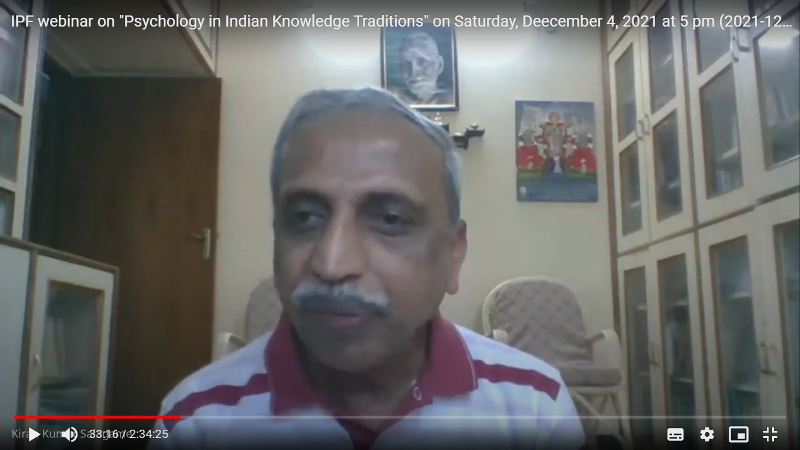
When he said that, for a minute, I was shocked because all the five years of psychology that I had studied and something more which I had learnt for my PhD appeared to be on shifting sand. Its foundation appeared very tenuous now because he is saying that it is not really the real state of consciousness. After recovering from the shock, I asked him what is the state that is the reference state in the Upanishads? Then he pointed out to me and said, it is called turiya. In the Madukya Upanishad, in the seventh shloka, there is a beautiful description of what turiya is in a very brief manner. Then I searched and found that with reference to turiya, everything is an altered state. That day, I should say I was twice born, in the sense that I realised that modern psychology has a very limited perspective developed from a frame, waking state is one such frame from which we see the reality. Whereas there is a whole expanse, full screen, from which everything can be seen. I realised that there is something deeper, something very rich information in our tradition. That was the first time, though I was aware of yoga and Upanishads, I started looking at Indian traditions and the psychological dimensions present in them. So, this is the initiation to Indian psychology as far as I am concerned.
Do we have psychology in Indian knowledge traditions? The answer is simultaneously yes and no. No, because we don’t have any codification of psychological knowledge. If we define psychology as many textbooks define as the scientific study of mental activities, functions and behaviour, there is no focus to study mental functions and behaviour as a branch like Arthashastra or Rajneeti or Bharatiya Kavya Mimansa which is related to aesthetics or Panini’s grammar and linguistics etc. Like this, we have many branches of knowledge. But, there was no manashastra as a codified branch of knowledge. But as Prof S K Ramachandra, who wrote a book, ‘Development of Indian Psychological Thought’ in 1962, says there was a lot of psychologising. Our rishis, thinkers, yogis and munis have done alot of discussion about nature of mind, its activities, various functions etc. but they have done it in different context. We can find psychological material starting from Kama Sutra and ending with Yoga Sutra. That is the scope of what we call Indian psychology. We can find them in Ayurveda, Mahabharata, Ramayana etc. We can find the psychological insights mentioned and discussed in various contexts, including the Upanishads and Yoga Sutra.
In a brief way, if we ask what is Indian psychology, we have Indian psychology in these things. Then, we also have them in Jaina literature and also in Buddhist literature. So, attempts were made back in 1900 itself to bring all these insights together and in a single place. As far as my research goes, Swami Vivekananda in his thoughts on Vedanta and Yoga, in California, specifically distinguished between Indian psychology and western psychology. He used the term Indian psychology and he characterises it. And then, in 1914, Mrs Rhys Davids wrote a book called ‘Buddhist Psychology.’ Then Aurobindo in his essays on education speaks about Indian psychology. In 1933, Prof Jadunath Sinha from Calcutta University, who was a philosophy professor as well as someone aware of psychology, submitted his PhD thesis on perception from the Indian perspective. Later, he published it as Indian Psychology: Cognition. Then, he wrote another volume called Indian Psychology: Emotion and Will. Then, he wrote Indian Psychology: Epistemology of Perception. So, we have three volumes of Indian psychology given by Prof Jadunanth Sinha. Then, of course, Swami Akhilananda wrote a book on Relevance of Hindu Psychology for Mental Health. Mohanlal Mehta wrote a book on Jaina Psychology in 1955. In the 1900-1970, many scholars of Indian tradition wrote books on Indian psychology. They were also attempting to introduce this as a paper at the Masters or Bachelors level but by 1980, people felt it is not gelling with empirical models of psychology. So those courses were closed. But again in 2000 and onwards, we have a number of books coming. Prof K Ramakrishna Rao who recently passed away on Nov 9, he along with Prof Anand Paranjpe and K.K.Dalal published a book called ‘Handbook of Indian Psychology.’ Cornelissen, Misra and Suneet Verma published books on, ‘Foundations of Indian Psychology. There are many books like that. So, we see that there is quite a lot of work happening in the new millennium. That is briefly how modern Indian psychology has developed.
If I have to give a crude analogy to distinguish why we use Indian psychology because there was an argument as to how we can use terms like Russian physics, German physics etc as physics is physics. But people are writing Chinese psychology, Japanese psychology etc. It is only to indicate the uniqueness of the indigenous origin of the ideas which are coming. If I have to compare, Indian psychology to modern psychology, I have to take the crude analogy of a landline telephone and a smart phone. Landline telephone is just serving one purpose and at the same time, it is rooted, it is stationary, it is tied to one place. Whereas in today’s smart phone, phone communication is only one small aspect, it is doing a lot more things which a landline receiver cannot do and is not equipped with. So, the scope of Indian psychology is like a smart phone or something more advanced which can come whereas the modern psychology has a limited perspective. I am not saying that modern psychology is not useful but I am speaking from the range of possibilities which the Indian saints and sages have understood about human psyche. So, that is what I would like to introduce as the psychology of the Indian tradition.
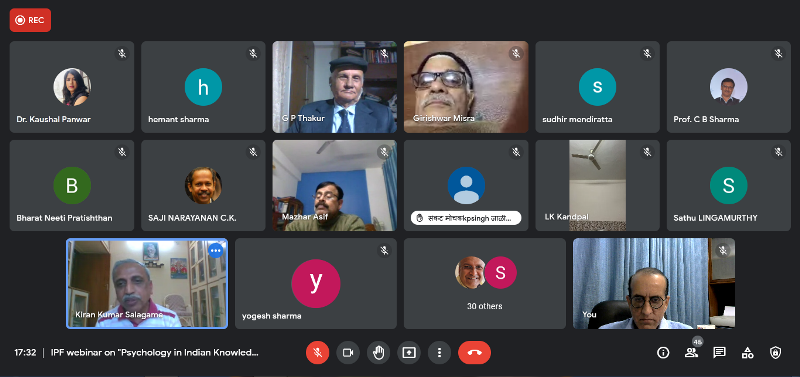
Now why is it relevant in the modern-day context? There are many parallel developments happening within the western culture, western society and also in knowledge development itself. So, in relation to that, if we see Indian psychology, we have a lot of things to contribute and there is a lot that has universal application value. First of all, when we think of development in the western society, which for a long time has been influenced by naturalistic worldview and subsequently modern science emerged from that and psychology developed within the context of that. So, you see that in that stream of understanding, the idea of science or scientific understanding had to limit itself to empiricism as you all know. Therefore, there is a limitation to our understanding. And even the culture is also oriented by the naturalist worldview. Therefore, anything spiritual, supernatural was all rejected. Even psychology also rejected the idea of soul. So, it is a soulless psychology as it has developed. But in the same culture, as many movements happened, for example, when hippies came, counter culture movement came, Beatles came and it started experimenting with drugs. They experienced different kinds of altered state and then automatically, they were open to new dimensions of the mind for which western theories and models could not afford any kind of explanation. So, they were treated as schizophrenics and some of them were fortunate to find Indian spiritual masters and they came to India. That is how one type of development happened and that resulted in transpersonal psychology.
Then of course, physicists were looking at what is the ultimate reality, what substance of which this whole universe is coming. So, from the Newtonian to quantum mechanics, there is a jump. And from quantum physics to particle physics, they went on. Finally, the whole issue of what is primary in the universe – is it matter or consciousness? So, physicists slowly moved towards the idea that consciousness is primary in the universe, not matter. Then, philosophers who spoke about hard problems like Chalmers, henow speaks of what is called panpsychism. There is another concept called non-locality. When you consider all these developments happening, the western physicists, neurologists, biologists, cosmologists, they have all started trying to understand Upanishads, Yoga, Kashmir Shaivism etc.
I want to just share something briefly. In 2015, I attended a conference called ‘Science and Non-Duality.’ It is a series of conference which happens every year in San Jose, California. There, for days the references were only three as I was hearing about India – Shankaracharya, Kashmir Saivism and Ramana Maharshi. But the participants were scientists and practitioners from all over the world. So, this is another direction from which Indian thinking is becoming relevant. Then of course, psychologists all over the world have realised that even including modern scientific psychology is governed by certain cultural worldviews. As all of you are familiar, each society, each culture has its own worldview which defines how we think and how we act, what exists and what does not. Therefore, in that background you see that cultural psychology, indigenous psychology, social constructivism and such new developments have taken place in the west and that has extended so that Indian psychology is also seen as being defined by a particular worldview which is spiritual and has determined our thinking.
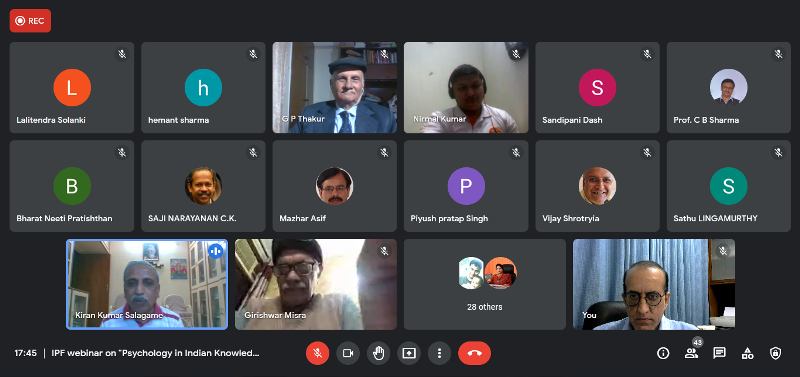
Recently, in 2000, a new field came called positive psychology. Martin Seligman had said thatwe clinical psychologists have spent more time only in studying anxiety, depression, suicide, schizophrenia and we are repairing the damage. We don’t know how people are resilient. We don’t know much about joy, happiness, well-being, what it means to live a worthy life, what it means to flourish. So, there is another avenue where Indian psychology has a lot of relationship and perhaps it has already done more contribution. Then, there is health psychology which is another field where the application of yoga and meditation came in a large way. You can see that all these developments which are happening in the western world have given scope for us to develop the Indian thought more and more. And it is not only in terms of direct relevance of psychology and society alone, even in terms of knowledge development, understanding, development of science. Recently, I was reading about what is called fractal epistemology. Fractal geometry, some of you may know, it is something different from Euclidean geometry where the repetitive pattern of the same set of measurements leads to certain patterns. So, if we look around, Indian classical music, Indian art, temple architecture and even what is called rangoli art, if you take all these different things, we find that India has a fractal mind. The theories of consciousness have said that the eastern and Asian cultures have developed non-linear mind more than the linear mind. We have left hemisphere vs right hemisphere, rational vs non-rational modes of functioning. Indian mind is specialised in more of non-rational mind. And all our understanding, concepts which have been developed from the Vedic times onwards, there is a lot of non-linearity in it. So, Indian psyche has its own uniqueness. Therefore, Indian psychological thought has a lot to contribute at various levels – at the level of socio-application and at the level of developing science. It is only a question of taking more interest in that and coming together to develop that. This is how I have understood what Indian psychology is or what Indian psychology can be.
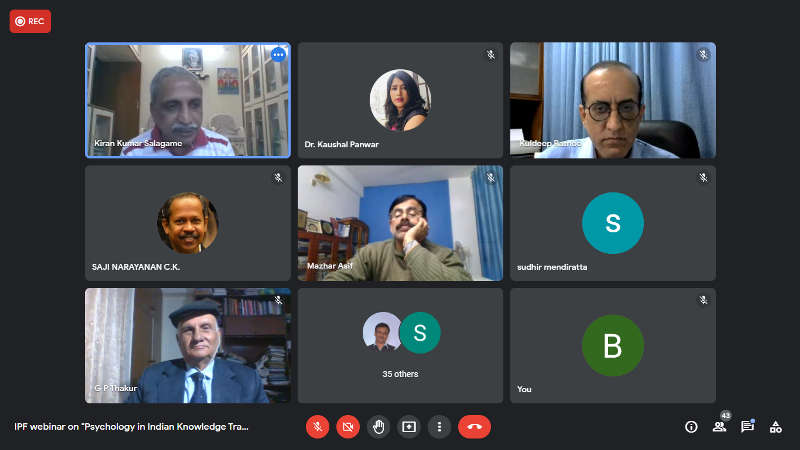
I have tried to introduce the basic outline of what is possible and what are its potentials. And as far as methodology is concerned, how do we develop it? Some people argue that modern scientific approach of third person methodology is not suitable whereas everything has to be first person methodology because our rishis understood everything through intuition and non-dual awareness. I do agree that there are many things we can understand only through non-dual awareness or intuition but whenever something becomes a concept, when it is expressed in language and if something can be told in a particular way, then I think, it is possible to quantify and use experimental methodology. For example, in Taittiriya Upanishad, in Ananda Valli, rishi says what is brahmananda? He puts it in exponential terms and says, take a prince who has all the riches, who has a beautiful wife and everything he can aspire for. To that he says, ‘eko manushananda.’ That is, one human ananda that he can get and hundred times of that is devananda. And at some point, he saysthat ananda which when multiplied by several hundreds and hundreds is ananda of ‘śrōtriyasyachākāma̍hata̠sya.’Which means the one who is not bitten by desire,his ananda is many times more than the ananda of normal human being, and finally he reaches brahmananda. So, that type of quantification and mathematical thinking has been there even in explaining our experiences.
So, I believe it is possible to develop our psychology in Indian tradition, be it in the Kama Sutra, be it in the Mahabharata or be it in the Upanishads, be it in the Jaina literature or Buddhist literature, depending upon their preoccupation, rishis, munis, siddhas, they have developed what is required of them. They did not bother too much about studying minds, the way we are studying today because the contexts are different. Today, we are living in this material reality, so our consciousness is limited. We are trying to deal with life. Therefore, our mental functions and studying it is related to how to survive and how to do this or that. But our rishis were more interested in transcendence. They wanted to experience pure consciousness, Atma Gyan. For them, how to stop the mind was the greater interest, that is why the second Yoga Sutra starts with chitta virti nirodha. Therefore, the contexts are different and accordingly, present day psychology has developed. And psychology developed in a different way. Though, it was not called psychology or jeeva shastra. But we have a lot of it.
Another part is psychology of Indian people. Today, Indians simultaneously have the tradition on one hand and the western influence on the other. So, there is a certain kind of confusion, a certain kind of interference. We have to also see how we can harmonise this rather than looking at them as conflictful. Our country has whole levels of consciousness. We have the tribal consciousness on one hand and we have the Sachchidananda (sat-chitta-ananda)understanding at another core. We can find all levels and degrees of awareness and we have to try to match the levels and develop ourselves.
I once again thank Dr Kuldeep for giving me this opportunity to make my presentation and share some of my understanding. Thank you to all of you!
Dr Kuldeep Ratnoo:
Thank you, Prof Kiran Kumar Sir. Thank you very much for highlighting the importance of Indian psychology and also emphasising the need to study and to explore the ideas of Indian psychology.
I have been a student of psychology and I am very keen to take this issue, this subject forward. I also practice Kundalini Yoga and I have also experienced certain things which I think need to be taken forward and given a scientific form. Because I think those experiences can be tested in whatever psychological tests we have, the impact of those practices. And that is why, seeing the unrest in the world, in the western world particularly and how Indians are getting afflicted by borrowing those ailments, by borrowing those lifestyles and practices. Definitely, there is a huge need and demand for our spiritual knowledge and whatever is covered. As you rightly mentioned, our rishis first experimented and then postulated on those concepts and then they wrote the scriptures.
We all know about what Para Vidya is and Apara Vidya is. Western psychology is focusing more on buddhi whereas our knowledge system focusses more on chitta, mann and manas. There is a huge scope for humanity to understand and to learn from Indian knowledge traditions.
Now I request Prof G.P. Thakur sir to take this subject ahead and kindly guide us on this topic. This topic is critical because psychology is becoming very important for humanity and whatever the west has given us is not helping. The west has focussed on analysis and deductive reasoning whereas Indian system is more about viewing things holistically.
Prof. G. P. Thakur:
Thank you very much!
Just now, Prof Kiran Kumar has wonderfully submitted whatever is available in the Indian thought and Indian knowledge. If I have to name two or three persons in the country who have given very good base for research in Indian psychology, one is Prof Rao who is no more now, another is Prof Girishwar Mishra who is here and third one I admire is Prof C.V.Dwivedi from BHU, but unfortunately he is no more. What is important is just to understand Indian psychology or Indian view on psychology, it is necessary to know or to have some idea about the language Sanskrit because all ancient books and other knowledge are available in Sanskrit. Unless and until, one is familiar with that language, it is difficult to understand what is basic over there. But I take a different term.
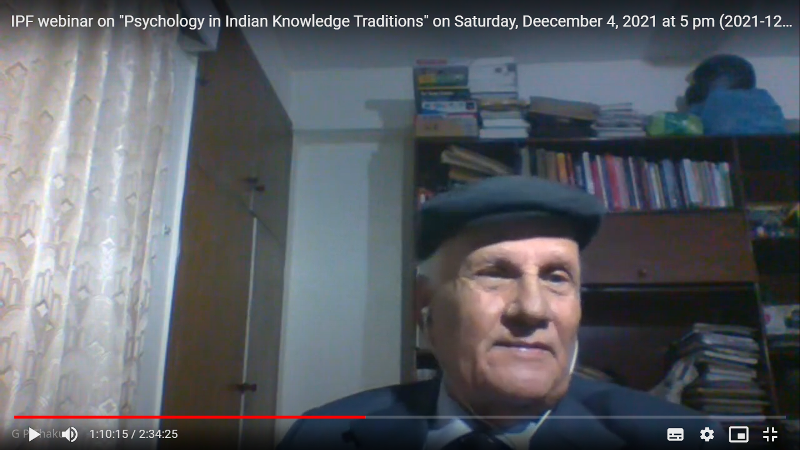
There is no doubt that Indian knowledge tradition has a long base which is thousands of years old. Even then, why this psychology, which has developed in the western world and we have borrowed it for many years, could not develop in our Indian culture or in our Indian traditions? The answer would be only one, that is, for hundreds of years, we had been under the influence of Mughals and then the Britishers. So naturally, we did not get an opportunity to know or learn about the Indian knowledge traditions. Even after India became independent, we had borrowed psychology from the west because compulsion was there. Psychology, if it is not scientific in nature, when I say scientific it means verification possibility should be there like a model, or paradigm or some theory,and then again re-verification is possible under similar circumstances, nowhere in the world will it be accepted.
In the late 1850s, when scientific psychology started, there came the study of individual difference. Before that everybody was believed to be having same kind of character, temperament and behaviour. But after introduction of intelligence tests, individual differences came to be studied. For any science, there are two things – what is to be studied and what should be the methodology. That was the period when psychology wanted to become science. Before that also, the philosophers tried to know about the human nature like Hobbs, Rousseau etc. Some said about the human nature that man is born with cruelty, some said no, humans are born very peaceful and others said no, humans change under the circumstances and so on. But these were all arm chair speculations and therefore not accepted by the scientific society. We know that first psychology laboratory started, while consciousness, feelings, images and sensations were the subject matter.The first criticism came in 1892 by William James. He talked about the continuity of consciousness for that purpose. I would like to tell you that in our literature, these ideas are already available for thousands of years:
चलं चित्तं चलं वित्तं चले जीवित यौवने।
चला चले ही संसारे धर्मं एको हि निश्चलः।।
It means, Chitta is constantly changing, but Dharma remains unchanged. This way, a very good tradition deriving from the source has been depicted in the literature but we have not taken this into account for a very long time. Whatever the modern psychology is, we may call it psychoanalysis or behaviouristic view, all the materials, are already available in our literature. I would like to give an example. In Abhijñānaśākuntalam, Dushyant and Shakuntala meet in a jungle, they get marriedand when Dushyant had to leave, he gives her one ring. Later due to a curse, Dushyant forgets her and when they meet, he does not recognise Shakuntala and it was the ring which helped him recognise her. These days, in our clinical psychology, when something goes to the unconscious, we have to take it down through scientific methodology, what we call as psychoanalysis. What is there in the mind and when it comes to the conscious level, then automatically the problem is over. In Dushyant’s case, that ring brought out what was dumped into the unconscious. In Ramcharitmanas, when Bhagwan Ram and Laxman were in the pushp vatika in Janakpur, he said,
कंकन किंकिनि नूपुर धुनि सुनि। कहत लखन सन रामु हृदयँ गुनि॥
मानहुँ मदन दुंदुभी दीन्ही। मनसा बिस्व बिजय कहँ कीन्ही॥
This is depicted in the Ramcharitmanas. The conceptswhich are described in modern psychology are available in our Indian culture and Indian society. We have not taken care of that. We did not make it scientific by using a scientific methodology.
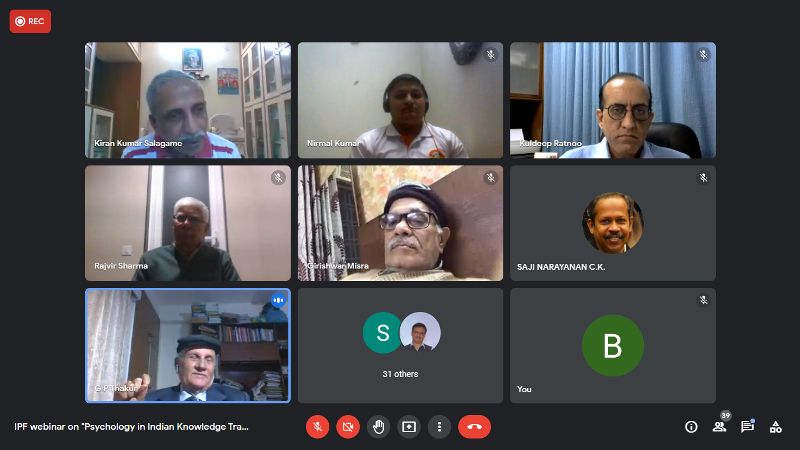
Psychology has one advantage; the advantage is intervention. Sociology also studies the same things as Psychology, but sociologists study from group angle. In psychology, we study it from the individual angle. Intervention is the speciality of psychology and we have plenty of examples of intervention available in our literature. In Ramcharitmanas, in Ayodhya kand in the beginning,
प्रसन्नतां या न गताभिषेकतस्तथा न मम्ले वनवासदुःखतः।
मुखाम्बुजश्री रघुनन्दनस्य मे सदास्तु सा मंजुलमंगलप्रदा॥
‘तथा न मम्ले वनवासदुःखतः,’ this point is to be noted there. Naturally, we could have taken care of our knowledge but we did not.
Also, from this intervention angle, most of the problems which do crop up from the middle age or the young age or even afterwards, they have the root cause in some traumatic experiences of childhood. We have to dig that traumatic experience and unless and until, that traumatic experience is not explained and cognitively restructured, the problem does not go away. In our literature, these are all available. These days, we are all talking of parenting. But if somebody asks what ideal parenting is, nobody can answer. If good parenting takes place up to adolescent period, then there will be only minimum kind of adjustment in the young age or even afterwards in human beings. This is very much clear in psychology. In our literature,
लालयेत् पंच वर्षाणि दश वर्षाणि ताडयेत्।
प्राप्ते षोडशे वर्षे पुत्रे मित्रवदाचरेत्॥
(Love your child as much as you can for five years, then for another ten years, socialise them. But the moment they attain the age of 16 years, treat them like friends. When we say friend, it means you become their real well-wisher and guide them on what they should do and what they should not do.)
Everyone wants to love their child but they don’t. When negativism takes places, when the temper tantrum starts, I have seen in many cases that parents don’t take good care. All those adults who oppose authority, the root cause is in poor management at that developmental stage. If these were taken care of during the stage of negativism and temper tantrums, then there would not be much of a problem in the later stage. What I wanted to say by giving all these examples is that we do have many such solutions in our literature but unfortunately, even after independence, we did not study it.
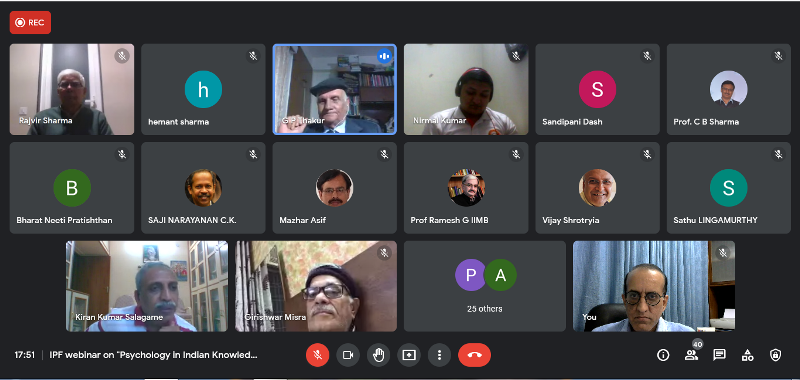
Another branch is parapsychology. I have read one book, Twenty Cases Suggestive of Reincarnation by Stevenson. Published in 1966, it is a very well conducted study. All the cases were of the Asian countries and there were well conducted interviews where incarnation was seen. Except one, all the cases of reported incarnation were the cases of accidental death. We need such type of studies. We have good treasure but unfortunately, nobody knows about it. If we have to love and enrich ourselves with the Indian tradition, then we have to take care of all these books and at one stage of life, we have to go through such things.
I would like to say one more thing. Any writing cannot be without psychology. Because psychology takes into account the mind and consciousness of the individual. How the mind can develop in a good way, how the people can achieve whatever is achievable, these things whenever written is all psychology. So, any writing cannot be without psychology. And since we have very rich writing in India, but unfortunately, since most of us do not have much understanding of Sanskrit, therefore we have not read many books. I think the new generation should take care of it and there should be some care, just to bring this psychological knowledge at the global level. On the basis of good and repeated researches, some paradigm and some theory should be there. It should be tested and verifiable. Then, it should be put before the western world. They will follow us and they will take care of it. This is what is required in the present times for psychology in our Indian tradition.
Thank you very much!
Dr Kuldeep Ratnoo:
Thank you very much Prof Thakur sir for guiding us and giving examples from Indian knowledge traditions, from our scriptures about the instances where psychology is very much visible, especially our psychological knowledge and psychological principles. As you were speaking, I was thinking about our Hanumuanji. When Hanumanji forgets about his strength, Jambavantji reminds him. That is the best example of reaching the unconscious. You were also talking about childhood experiences. We have plenty of examples like Abhimanyu getting the knowledge in the womb and many people carrying on with the Karma and Sanskara of previous lives. As you mentioned, there is a need to study it in an objective, scientific and quantifiable manner and put it forth before the world for the benefit of humanity and for the benefit of our coming generations. It is very painful to see young students committing suicide under stress, not being able to handle the increased expectations of parents and society. This is very painful. Human life is much more than making some materialistic advancement. There is too much of pressure on our younger lot to achieve something materialistically. Human life, experience and human contribution are much more than some money or some position or some package. There is a lot of talk about technological advancement, material progress but without having a peaceful mind, all the materialistic advancements will mean nothing. For that psychology and particularly Indian psychology will play a very critical role. It was great to have this session.
Q&A Session
Sanjay Kumar: What are the five major methodological differences in Indian and modern psychology?
Prof Kiran Kumar: When you consider the western methodological tradition as a whole, particularly when empiricism took greater roots, science became more limited in its methodology. The question of observer-observed difference, the question of measurement and the assumption behind it that anything which exists should be available for our panchaindriyas(five senses) and they should be quantifiable. So, this we know as empiricism, strictly speaking. The question of verification, repetition of the experiment etc. is only another extension of the same. The rational thinking was supposed to support the empirical data to arrive at proper conclusion,so western sciences as a whole are based on these two fundamental aspects.
Another thing is a distinction made in philosophy between the context of discovery and the context of justification. For example, Kekulé’s benzene ring where he had a dream where he saw snakes coiling in a particular way which gave him an insight about what may be the structure of the benzene ring. The dream or intuition of Newton when apple fell on his head etc all considered intuition. They are the context of discovery. But all intuitions do not necessarily lead to formulation of certain principles and laws. Therefore, the question of justification came. When the question of justification came, all the methodological rigour, procedure everything also came. So, these are some of the important features of western methodology.
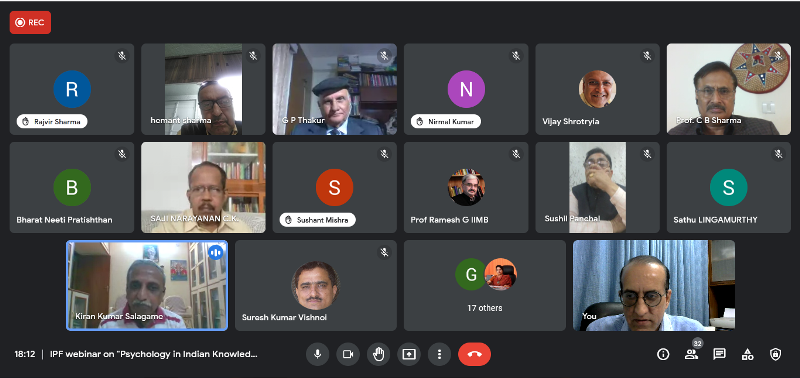
But in the Indian tradition, when you take the Jaina and Buddhist tradition, you willsee that the Vedic tradition has kept transcendence or transcending reality as fundamental. Therefore, the Vedic and Upanishadic view is that transcendental is always transcendental. It always remains beyond any kind of conceptualisation. Leaving that apart, when somebody has an experience and comes back, how we communicate it, how we justify it, how we systematise it, how we codify it,is important. We know what is called pramanaand Indian tradition has recognised many pramanas, Vedanta recognises six pramanas, the other traditions recognise certain number in different ways. So, what happens is pratyaksha and anumana, observation and inference, are the two primary pramanas of the western tradition. But the Indian tradition goes beyond pratyaksha and anumana to speak about metaphor, analogy and then apta-vakya. Veda itself is considered pramana by itself. Like this, different things are taken.
Now are they wrong in taking them as what we call pramana? Not necessarily. Even in modern science, if you see a scientific journal, if an article that is one and a half page, there will be three-page references. That is called apta-vakya, authority.Now, analogical or metaphorical way of convincing an argument or giving illustration is very characteristic of the Indian mind.When you come to a subject like psychology where the object of experience, object of understanding, object of explanation or whatever we are doing, is abstract and not concrete. Psychological theories are developed based on metaphors only. When Freud and Jung developed theirtheories, they used metaphors only. Carl Jung was familiar with certain developments in physics so he used metaphors from thermodynamics. Freud used the metaphor of iceberg in ocean for his theory to give the levels of the mind. So, in psychology, metaphors and analogies are also used. But as far as possible, experimentation is given the primary consideration.
In Indian thought, we cannot say that our rishis did self-experimentation onlyand observed everything. It is not necessary. If you think of rishis and munis, they all lived amidst nature. They were keen observes of how the plants grow and how the animals behave. They observed human beings and they used their observations to give examples. For example, how we get lost in ourpanchaindriyas. They give examples of different animals. For example, elephant is taken as an example to illustrate shrotra indriya, deer is given as an example for another indriya. Like that, it goes. Each animal loses itself, loses its life because of the dominance of a particular sensory organ. It falls prey. So, man is falling prey to all the five senses. Therefore, he is doomed. This analogy comes in Upanishads or in Yoga Sutra. Our rishis were very capable of observation, they also conducted experiments. Otherwise, they couldn’t have written Kama Sutra for example. Like what should one do to give birth to a healthy child, a bright child, when conception should take place and things like that. Such things were developed, partly due to observation and partly due to intuition. I believe that Indian rishis had incorporated different strategies or procedures in developing knowledge. I have not thought in that direction so I cannot list the methodological issues in numerical order. But I am able to explain in this way. I hope I have answered the questioner to his satisfaction.
Prof Hemant Sharma: There is concept called the great MEC – motivation, emotion and cognition. Most of the work in Indian psychology has been done in motivation, will, volition, cognition, emotion etc.
Regarding motivation in Gita, there are desires, and goals or outcomes, parinaam. In all our Indian traditions, particularly religious traditions, the desires have to be controlled, meaning repression of desires. But in motivational theory of goal setting, we start with desire, then expectation, and then incentive, regarding the anxiety or knowledge of the goals, what we are doing and what will be the outcome in society or for ourselves.
Regarding emotion, as per the Three Factor Theory, pleasant-unpleasant, tension-calm and type of expectations are important. Our concept of Sthitpragya in Gita and the Veetraag concept in Jainism aremildly different from Self-actualisation of Rogers, Goldstein or Maslow. But how can we be without any sensation, feeling or thinking, as in clinical psychology and abnormal pathology, one concept regarding clinical patients is “Anhedonia”, that is no feeling of good or bad, no feeling of right or wrong, no feeling of sensation.
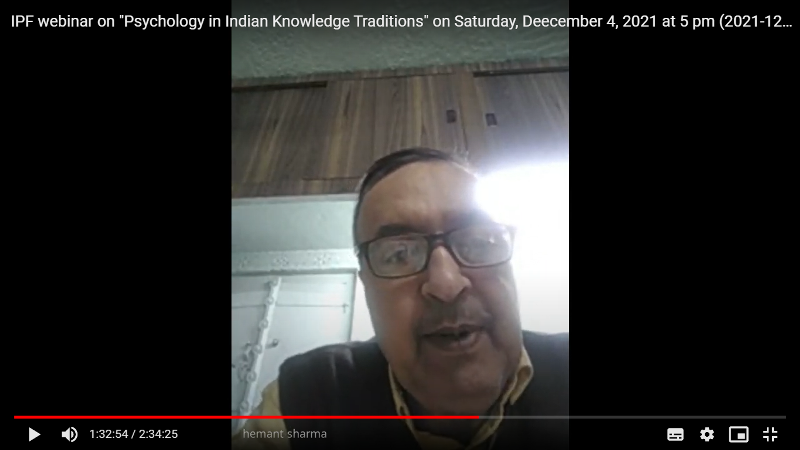
Regarding cognition, our memories and experiences with the past and our imagination with future perspective are important. So the past, present and future are in a continuum, a continuous variable, not a discrete variable. So, we cannot forget all the past events while taking consideration of our present, and we have to think imagination even regarding the past events. So, these are three factors of motivation, emotion and cognition, on which I want to enhance my knowledge regarding Indian psychology.
Prof Kiran Kumar: A clinical condition of anhedonia is where your pure consciousness, or Turiya, is not awakened. Your identity is still mixed up with a bio-psycho-social awareness. Therefore, you are in an unconscious state, you may not experience anything. But a yogi or rishi who practicespratyahara, he is in a different platform altogether. He is established in awareness or you are moving towards establishing yourself in a different platform of awareness, in which case, you have only switched off your sensation. It is like putting our laptop or computer on a sleep mode. Putting our laptop on a sleep mode is a conscious thing whereas the laptop going off because the battery is completely down is a different thing. Anhedonia is a condition where because of systemic failure, it can happen. Whereas pratyahara in yoga is the rishi wanting to stop his sensory function, is a conscious process because he is in a different level of awareness.
Dr Jyoti Kiran: I am attending this webinar from the USA. Being an economist and being exposed to the economic grammar of the western world, I would very much relate to the observations made by Kiran Kumarji. Yes, we do not have a proper format or proper language to interpret the Indian school of thought, Indian knowledge in the western paradigm. So, my congratulations to speakers for that!In the post-Covid era, two techniques are being used here in USA, the first is the mindfulness and the second is the cognitive behaviour technique, to deal with post-Covid ailments like stress, depression etc. How do we relate and interpret them in the Indian school of thought or Indian Psychology? Do we have any technique and do we have any evidence, and if so, how are we using it?
Prof Thakur: The two techniques what you have mentioned are being extensively used in the field of clinical psychology. What we are doing in cognitive restructuring is, first of all, we understand the baseline of the problem and then we take a decision on how much we have to take it up so that the intervention is planned accordingly just to reach that level, just to reach that goal. While doing a step-by-step cognitive restructuring, what we exactly do is, we change the mode of imparting intervention. I will give you one example. There is a book in Hindi called Rashmirathi by Ramdhari Singh Dinkar. In this book, Krishna goes to see Duryodhan and talk about how to find a solution. So, the baseline is determined in the cognitive restructuring. Then he asks Duryodhan to give atleast five villages to the Pandavas but the offer is refused. After this, Duryodhan orders his soldiers to arrest and chain Krishna. Then different type of intervention was given. Krishna warned Duryodhan that he can never be contained in chains and asked him to first try chaining the universe. It was a reality check given by Krishna.Then again, it was taken one step further. It was the final stage and it was clear that Duryodhan was not going to yield to the proposal offered by Krishna from the Pandavas. What I wanted to say is that in Covid period also, there were many studies and interventions. So, different types of strategies were followed.
Prof Kiran Kumar: Indian mind, Indian culture, as you know, people speak of individualist and collectivist society. In individualist societies of the west, taking two doses of vaccine has become an issue with their freedom. The issue of individual freedom is so much there that they are not following anything. On the other hand, in India, it is not like that. We are able to achieve the first dose vaccination of more than one billion people, simply because India has the tradition of experiencing plague and many other epidemic diseases. We know what it means and how it creates problems. It has been passed on from one generation to another and we have some knowledge of it. When it comes to safety of others, Indian mind thinks not only about oneself but also about the safety of others. Therefore, in spite of some ignorant people who have false ideas about vaccination, majority of Indians have obliged and they have taken two shots. If the vaccination were available in plenty and the western world were not to hoard the vaccines, all the 130 crore people of India would have taken both the doses of vaccine. That is the situation.
The second point is whether we have something about cognitive restructuring. It is happening at the collective level, not at the individual level alone. Collectively, every news channel, every phone service provider has been giving instructions on safety precautions. So, automatically, these two things have multiplied together and India is in a better position to deal with it. That apart, there are so many people who are distressed and who need counselling. For them, mental health professionals are using mindfulness and cognitive restructuring. We have all these things and we are using them at the individual level. Group counselling is going on. Over and above that the Indian mind is such that we are able to have greater resilience and we are able to follow.
Dr Ratnoo: Adding to the point, I think when we talk about the need for counsellors or the need for counselling when the society is distressed, I sometimes wonder the great job done by the lyricists of Hindi films. Plenty of songs work like a counsellor. When we listen to so many songs from the perspective of psychology, the guidance being provided in them to the listener completely changes the outlook of the world even if the person is facing adversities. I don’t know how many studies have been done regarding this.
Second point is, we believe in a continuum of cycle of birth and death till moksha is achieved due to which death is not a painful or fearful experience. Death is only a junction or it is like changing clothes. So, when Kabir says,
जा मरने से जग डरे, मोरे मन आनंद |
कब मरहुँ कब पावहुँ पूरन परमानंद ||
That acceptance of death like it is a blissful experience itself creates a lot of peace within. Unfortunately, in the west, they always emphasise that there is only one life and they fear death. They want to delay death till they feel that they have enjoyed all the pleasures of life. But we feel in a different way.
The third point I want to mention is, I follow Shri Guru Ram Lal Ji Siyag from Rajasthan and I practice Kundalini Yoga in which the awakened kundalini cures tri-mode afflictions – the physical, mental and the spiritual ailments. Physical ailments, we all know that Covid is there. Due to the anxiety and fear of death, the mental problems are also occurring. But no physician or a psychologist is able to explain what the spiritual afflictions are. It is only in the Indian knowledge system that the cures are being provided. That is through spiritual meditation – how to become oneself and realise the cause, effects, outcomes and the solutions. I would say that the world needs our solutions of meditation, spiritual meditation, yoga as pointed out by both our speakers. We have become too pessimist and doubtful about our knowledge and we try to imitate whatever west has been doing and whatever the west has been talking about. The biggest problem is we accept their model and try to fit our model into their parameters. It is like taking the clothes of a fashion model who has a skinny body and trying to fit her clothes into a middle-aged Indian woman and then setting a criterion of whether she is beautiful or not. We need to avoid falling into the trap which is being created by them and we need to create our own systems, parameters, strategies and solutions.
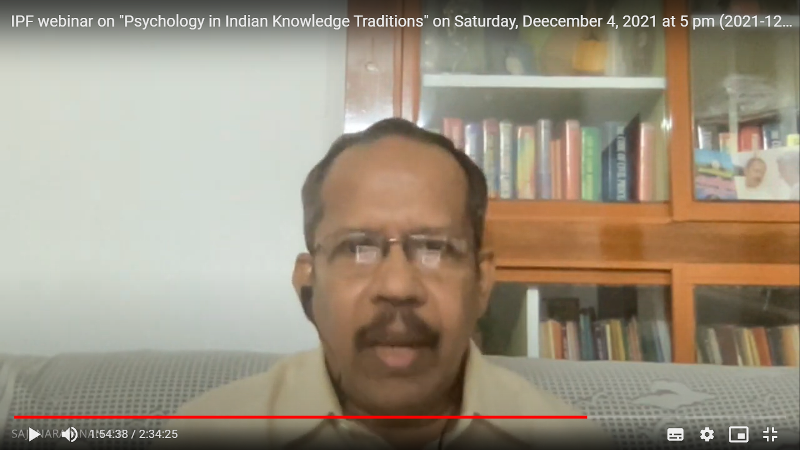
Saji Narayan: At the beginning, Prof Kiran Kumar ji had enumerated some of the commentaries and books on Indian psychology. One problem with reading some of these books is that they begin with things related to western psychology and they immediately go to bodha shastra, that is, science of consciousness and it moves to sort of philosophical discussions. The entire world is now looking at the Indian paradigm as a solution to the issues faced by the world. So, for practical psychological issues what are the contents that Indian psychology has to give. As you rightly said, India has gone to the fourth state of mind, turiya. Then there are certain concepts like ananda, samadhi etc. These are all discussed. So, an in-depth study on these things is required in the modern context. The universe is a projection of the mind. This is one major issue in modern context. Aurobindo had studied about psychology. He studied about higher mind, super mind etc. Then there is science of senses, how to transcend senses. Balancing of mind or bringing it into equilibrium. This is the core of Indian psychology. In Bhagavat Gita also when Sri Krishna counsels Arjuna, he says that the mind has to be in equilibrium. The most important thing is he has mentioned 14 personality models, sthithpragya etc. Studies on these aspects are required. Then issue of practical training, we call it sadhana. Then, discussions on abnormal psychology, starting from duality. Then Bhrithari mentions about phobias in human mind, which goes to the terrain of psychiatry. The theory of kleshas is also important. Personality development is also a big area. There, Patanjali has made five models. Then Tri-guna based classification of personality. Science of instincts or vasanas also requires in-depth study and how to purify those vasanas by sanskaras. There is this concept of akhanada mandalakara which starts from the child. Then training in sanskaras. And lastly, there is higher psychology, yoga psychology, ashtanga yoga, dhyan etc. By psychological training or sadhana, you will get siddhi. Then Yoga Nidra, Kundalini, etc also need to be studied. So, regarding the content also, we need a lot of research and in-depth study.
Dr Kiran Kumar: For the information of all of you, I would like to say that some of the books that were written with the title Indian psychology have covered many of the topics that you have listed. For example, ‘Foundations of Indian Psychology’, edited by Cornelissen, Misra and Verma, and published by Pearson Education, came in two volumes. In this, an attempt has been made to cover the different topics that you have mentioned, under different sections. Another book is ‘Consciousness, Indian Psychology and Yoga.’ It is a publication by History of Science, Philosophy and Culture in Indian Civilisation, and edited by Kireet Joshi and Cornelissen. It was based on the proceedings of the Conference on Yoga, Indian Psychology and Consciousness that was held in Puducherry in 2002, where many of the topics you have listed are covered.
So, it is not that people have not attempted to look into these issues. For example, throughout my career, with the help of my Masters Dissertations and PhD scholars, I have tried to develop certain tools. For example, I have developed something called the Ahamkara questionnaire. What is ahamkara in Indian thought? How to conceptualise it, operationalise it and measure it? One of my students has developed something called yama-niyama inventory. How to operationalise yama and niyama and develop a questionnaire. Yama-niyama is not only yoga. It is nothing but virtue and conduct. And all of us have certain degree of yama and niyama with us. It is a personality variable, so we can assess it. Another PhD student has tried to develop a small inventory on kleshas from Yoga Sutra.
As far as triguna is concerned, that was the first Indian concept which has been sufficiently examined starting from 1969, whenProfE.G. Parameswaran from Osmania University in Hyderabad took interest in that and developed a tool. Since then, at least 10-12 scales have been developed. In 2007, one of my research students did a review of that and it has been published in Psychological Studies.As far as child psychology is concerned, Prof Malavika Kapoor has written a book on Sanskaras.
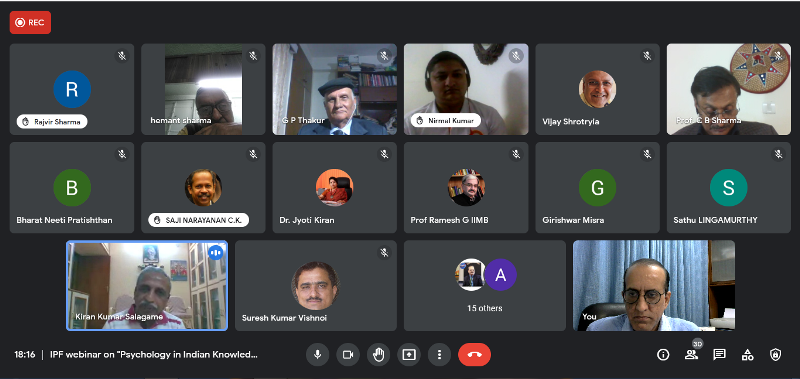
Now it is up to Dr Kuldeep Ratnoo as director of IPF to bring together all these efforts. Now, you said why people start with physics and then go to consciousness. We have to see this atthe global level, where they are speaking of primacy of consciousness, not matter. But our Indian physicists are not bothered about that. I have interacted with top physicists of our country. They were not very open to these ideas. The problem is we are still colonised in our minds and we do not want to think individually. We don’t want to think creatively. We don’t want to say Pranayama is Pranayama. But if someone says Pranayamais breathing in and breathing out, we accept it. But Pranayamais not breathing in and breathing out.Prana exists ontologically. It has a reality of its own. We cannot reduce it to oxygen letting out and coming in. It is our fault not to explain it properly. I have no qualms to say that our top people in top science institutes of the country or policy making people, if they don’t take up these issues, what can I do as an individual professor. I have done my best in my career of 34 years. People, who have genuine interest, they have contributed, but if people at the helm of affairs don’t take interest, what can be done.
I can mention an incident. Some 25 years ago, at Bengaluru, in Bharatiya Vidya Bhavan, a group of people were invited, who included physicists, psychologists, literary people,to create some books on value education for the youth. I was also invited because I was doing research on personality from Indian educational point of view. After six months, a review meeting was called. Then I mentioned about transpersonal psychology, how things have developed, spirituality etc. The very honourable chair, a top physicist this country has seen, asked me to remove all the spirituality from what I said. Then I asked if we remove spirituality then what is left of the Indian point of view? If I remove it then Freud, Jung and all other western thinkers are good enough. Since I countered him, I was dropped from the committee itself. Because he was a very powerful person. This kind of thing doesn’t give intellectual freedom. This is the reality of India. Recently I saw an article why Indians go abroad and do well. Why top IT companies are headed by Indians? Because when you go abroad, people receive you. I have attended many international conferences on being invited as a speaker, they listen to you, they appreciate you, but they don’t want to take it because it disturbs their authority, it is like rattling the applecart. So, we have to say Prana is Prana, Ananda is Ananda. Ananda is definitely not bliss. But if there is no other term, we say ok, it is the nearest term to use.
Prof Thakur: Very well said. I would like to submit one point. It is not that attempts have not been made. There are many available in the literature and to our knowledge as well. Yet, we have not reached the stage to draw the mind of the world to Indian psychology. If one idea, that is in the Gita again, कर्मण्येवाधिकारस्ते मा फलेषु कदाचन - what are the components, how could this be developed and if this type of framework is done collectively, I think this will be holistic in nature. Many of the problems that we are facing these days all over the world will be solved.
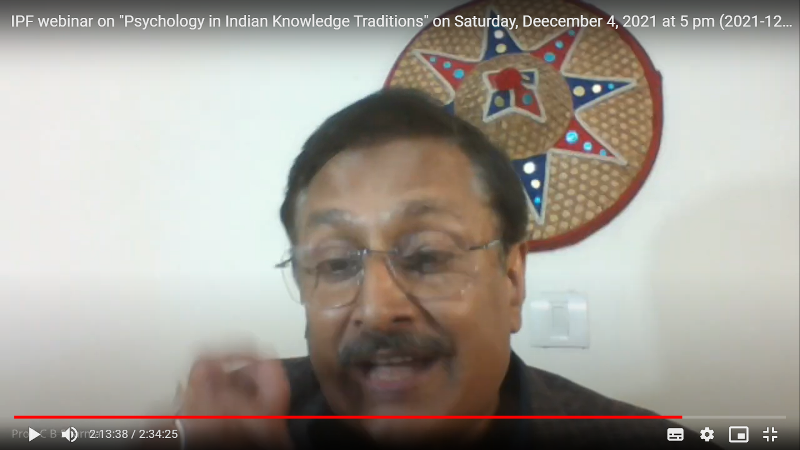
Prof Chandra Bhushan Sharma: I am an educationist, not a psychologist. But I could see the pain in Prof Kiran Kumar’s presentation. How is it and why is it that in all these years, we have not been able to infuse the Indianness into our education? Had we taught all these to our children in the last 74 years, we would have been in a different situation. We should have been having many such scholars working on Indian Psychology, but why we are in short supply. We are at a very crucial juncture. We are in the process of developing the national curriculum framework. My take on it would be that we have slowly removed all the Indian elements from our school curriculum. You keep trying to infuse Bharatiyata in higher education; you keep trying to teach Indian Psychology to college students, you will never be able to achieve what we want to achieve. You will have to start from the school, from the class one.Why we removed the story of Shrawan Kumar from school education, why we removed patriotic poetry of Maithili Sharan Gupta and Ramdhari Singh Dinkar from school books? We have given the best to the world as Psychology is concerned. Why is it that our corpus was translated into English, went to the West and cameback in the names of their scholars, and we know their names and not our scholars’ name? This is not a question but I am raising this for introspection. What should be our policy about school education, where should we intervene so that 2030s become India’s decade? How would West start reading us, start realising that they have copied, borrowed, stolen from our corpus? All that we teach in education was our knowledge, which was translated into English, German, French and returned to us. We need to introduce Indian thought to primary education. Unless we give this knowledge to our children, nothing can be done at the higher education level. These are my observations as an educationist.
Nirmal Kumar: We have been fed inferiority through education and media. We are made to think that those who follow western culture are superior. Those who talk about Indianness are considered inferior. My question is that if Indian Psychology is having such a critical knowledge, is there any institution in India where Indian psychology is taught using Indian languages?
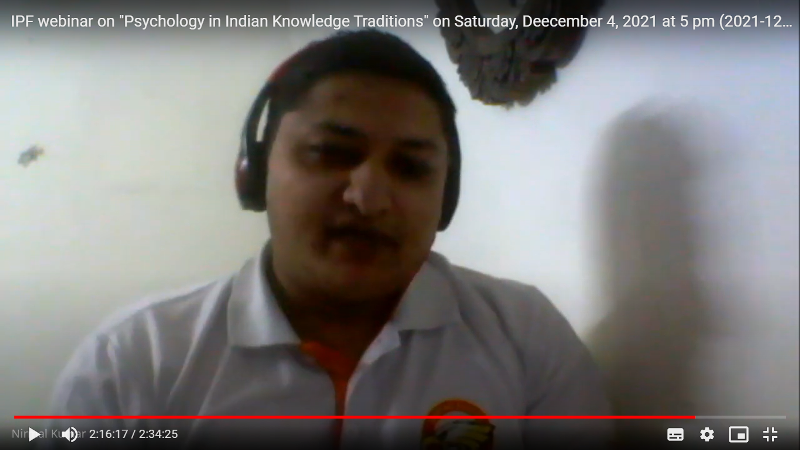
Prof Kiran Kumar: There is Indian Psychology Institute in Puducherry established by R. M. Cornelissen, a Dutch doctor who became a discipline of Sri Aurobindo and Mother, and has been in India for the last 30-40 years. It is mouldedin the framework of Maharshi Aurobindo. But Sanskrit as a medium is not used. It is not being spoken from a very traditional point of view. Though he himself has exposed and is well aware of that. So, the example of an institution teaching Indian Psychology in Sanskrit is not in my knowledge. Gurukula Kangri University has a course on Indian psychology. Maharshi Dayanand College in Delhiis interested. So, nowhere a paper or a course on Indian psychology is offered in Sanskrit in India. In 2016, a UGC committee was established to take a relook at psychology curriculum, and the impetus had to come from Canada for that. We did introduce some courses on Indian psychology from the Bachelors to the Doctoral level. But as I said, it is difficult for people to accept this as psychology. You have methodological problems, ontological problems and you have metaphysical problems, and you have what is called scientism. Scientism is a word used to mean it is very narrow. Those who are convinced, they have done the work. Now it has to be taken it to next stage. Once, there was a big conference at Roorkee of NAOP (National Academy of Psychology), where we had a symposium on Indian Psychology. An expert professor from a top university of India remarked that it is neither good Indian philosophy nor good Indian psychology, and went away. Because people don’t have proper perspective about it. About the language, we cannot teach everything in Sanskrit today. We have to accept certain social realities of the present-day context. But we can communicate and convince people that this is psychology. When I go to give talks on positive psychology and talk about Santosh, Harsh, Ullas, Prasanna, these are all different positive mental states, the students look surprised. I tell them that these are not names of boys and girls, these are mental states. But they don’t know what these mean. See, Sanskrit people are too rigid and they do not want to come out. Psychology people are not exposed to it the way they want. It is the communication barrier that we have to break. Then it is possible. It is the question of how to articulate the idea.
Prof Thakur: In Kashi Vidyapith, there is a paper on Indian psychology. There are also some other universities in Bihar which offer a paper on Indian psychology. Knowledge of Sanskrit is important for texts to be translated to other languages. Recently a book on school psychology has been translated into 20 languages. Now Indian prime minister has said that even engineering will be taught in local languages, then the day is not far when Indian psychology will be taught in regional languages. We need to be patient.
Dr Kuldeep Ratnoo: I want to add one point. Prof Kapil Kapoor, who has been the Chairperson of India Policy Foundation, was heading a committee to form the language policy of India. He submitted the report to the government in 2016 in which he recommended that right from the nursery up to PhD levels, teaching should be in the mother tongue or state regional languages. Government has lot many hesitations and but slowly it has accepted upto the primary level. We are pushing it to take it to the higher level. It will take some time as our policy makers are trained in a different mind-set, in a different orientation. There needs to be a lot of political pressure and public awareness to make it happen. We need to form a group of academicians and intellectuals who can provide guidelines to the policy makers. It is an effort and there will be light at the end of the tunnel.
Arunim Kumar: What would be the most resonating and appealing syntax for modern day Indians for communication of psychological functions that has minimal influence from non-regional civilisations? Is it possible to use the methods of people like Jiddu Krishnamurti, Dr Goenka and Sadguru recently to propagate our methodologies?
Prof Thakur: These are all efforts which contribute to it and are used to communicate the ideas. It is important to increase the sensibility of the individual at this level. But to increase the sensibility depends on how it is being communicated. It can be through local dialect or in any manner one can understand in the best possible way, and become convinced. In management terms, we call this communication effectiveness. The efforts by the people you have mentioned contribute to this. But it will take some time for these efforts to be successful and we have to wait patiently for it.
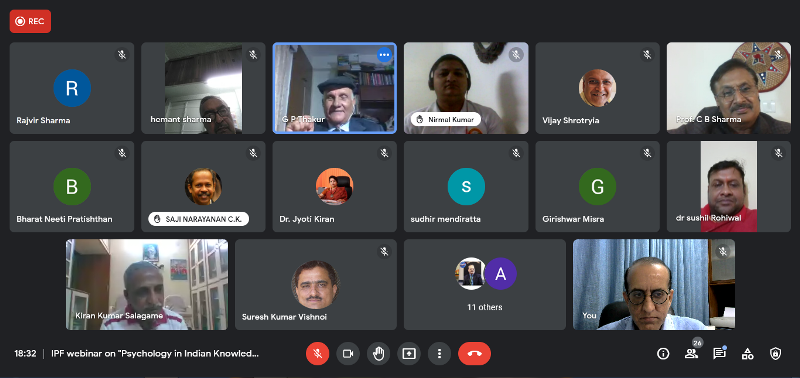
Prof Kiran Kumar: I can say something from my personal experience. If Dr Kuldeep has invited me today, it is because of my papers in English which he may have come across. I have some knowledge of Sanskrit but I communicate my ideas in English only. I try to check with Sanskrit scholars about certain terms etc, so that I don’t do injustice to our parampara, about whether my understanding is correct or not. I also request Sanskrit scholars to check my writings, but so far nobody has pointed out any gross error. If I have understood a particular subject properly, language is no barrier. It is only a medium of expression. It is true that Sanskrit has its own flavour, its own concepts which cannot be reduced. There, we can not and should not reduce it. We have to say this concept is this and we should use that word only. Terms like Yoga, Guru, etc remain as they are. Atman is Atman only, at the most you can use a capital S in Self, but it is never a bio-social identity. It is a transcendental, spiritual awareness. So, if you have conceptual clarity, language is not a problem. It is only a matter of effort and time.
Dr Kuldeep Ratnoo:
To conclude, I just want to say that the knowledge and what we call, prarabdh and the samay chakra keeps on moving. Earlier, India was the centre of learning. Then Arabs learned from India and from Arabs, Europe learnt. From there it went to America to Japan to Korea to China and again it is coming back to India. This is going to be our millennium. The train stops for the longest time in India and at other places, it stops hardly for 10-50 years. We have a responsibility to recognise that samay chakra keeps on moving and we are rising again. We need to appreciate the efforts of scholars who studied and who have been studying these concepts and brought these to the notice of the world. We just have to add our efforts and take the work forward. It is a divine intervention also and it is not just at academic level. Globally, we see that the situation has been emerging where the western knowledge systems, particularly the modern sciences have been finding themselves incompetent to handle all the crises. There is a larger responsibility and I would say it is India’s burden to guide humanity now.
In that direction, taking forward Indian psychology is one part of that. There are other subjects also, like the sciences, economic principles or political thought, philosophies etc. We have taken this topic today and we were very lucky to have such an eminent panel and eminent participants. Thank you very much for giving your precious time and listening to us. On behalf of India Policy Foundation and all the participants, I thank Prof G.P. Thakur and Prof Kiran Kumar for giving us your valuable time and guidance. We will definitely take this subject forward. Thank you very much!
***
